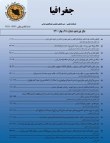Investigating a Model for the Role of Local Communities in Sustainable Social Development of Cities (Case Study District 8 of Tehran)
In today's urban planning literature, the neighborhood is considered as a social structure and a cultural phenomenon with a clear border and identity and various factors are crucial and effective in weakening or strengthening it. Today, local communities exercise a positive impact on urban social sustainability on account of their nature. But despite the human focus on defining sustainability, it is Surprising that scant attention has been accorded to the definition of social sustainability in environmental disciplines. However, social sustainability is one of the three pillars and frameworks of sustainable development. One of the foremost categories of social sustainability is the socialization of neighborhoods for all social strata and groups and the occurrence of social interactions in light of social sustainability for them. The need to create social communities and interactions includes building trust, sense of belonging, and participation because the restoration of civil society and the promotion of participation shall not be possible without the restoration of local communities, the protection of the local public sphere, and the provision of local participation. And local communities are considered as one of the main prerequisites for moving towards a sustainable urban future. In other words, these communities are vital elements and one of the strategies for sustainable social development of a neighborhood. In the meantime, the metropolis of Tehran as a political, economic and social center of the country for reasons such as lack of social convergence, lack of social capital and participatory spirit among local residents, lack of sense of spatial belonging and weakness in neighborhood management ties in the field of social sustainability are prone to weaknesses and have not thus benefited from social capitals. And these issues have led to the loss of real formation of local communities among neighborhoods in Tehran and this has led to severe divergence in social interactions and communications. Therefore, this study aims to measure the effectiveness and the role of social interactions in neighborhoods pertaining to region 8 of Tehran in social sustainability.
The present study has been developed by using a descriptive-analytical method with an applied nature in the form of structural equations. Data were collected by library and field method (by questionnaire). The statistical population of the experts group consists of geography and urban planning, urban planning and sociology, which is used to determine the sample size using SAMPLE POWER software and using structural equations method in the data analysis section, as well as in order to generalize and rate the scales and consider the confidence interval of 0.95 and the coefficient of influence of 0.19 and considering the number of hidden and obvious variables. One hundred people were estimated to be selected by simple random probable method. According to theoretical literature and background and studies, research variables including social sustainability as exogenous variable and local communities which can be measured by three social, economic and cultural variables were identified as endogenous variables and a total of 20 indicators. For a proper validity of the questionnaire, the opinions of professors and elites have been used so that the indicators explaining the indicators were sent to 25 people in the form of questionnaires and they were asked to measure the initial validity between the indicators of the questionnaire. Finally, the data collected in SPSS software and taking descriptive statistics and subsequent analysis in structural equations (SEM) were implemented. Data analysis was performed by Amos software.
In studying the paths and coefficients obtained in the research assumptions in the first stage, three economic, social and cultural conditions have a significant effect on local communities and local communities on social sustainability. Based on the amount of path coefficient (beta), the intensity of the effect and the direction of these studied pathways have also been evaluated positively. Beta value in the path of economic situation affects local communities with coefficient of 0.155, social status on local communities with coefficient of 0.570 and cultural status on local communities with coefficient of 0.403 and finally local communities affect social stability with coefficient of 0.632. Among the variables affecting local communities, social status had the greatest effect and then cultural status and finally economic status. Finally, local communities have an effect of 0.632 on social sustainability in region 8 of Tehran. In other words, if the exogenous variable (independent) of local communities changes one unit, social sustainability will change by 0.632 units in the same positive direction. Therefore, it can be said that the research hypothesis, which is the role of local communities on sustainable social development, will be confirmed.
According to the conceptual model of the research, it was found that economic factors and social factors and cultural factors affect local communities, but the impact factor of each of these factors on local communities is different. The results which confirm the positive and significant role of local communities on social sustainability, with the results of Sajjadi and Vahedi Yeganeh (2017), who considered the role of local communities' participation in social sustainability significant and also, with the results of The Research of Dadashpour et al. (2012), which investigated and explained the position of trust in local communities and considered it significant; also, with the results of the research, Dadashpour et al. (2012), who investigated and explained the position of trust in local communities and considered it significant. The results achieved by Pourahmad et al explained that the role of neighborhood management in social sustainability is aligned.
- حق عضویت دریافتی صرف حمایت از نشریات عضو و نگهداری، تکمیل و توسعه مگیران میشود.
- پرداخت حق اشتراک و دانلود مقالات اجازه بازنشر آن در سایر رسانههای چاپی و دیجیتال را به کاربر نمیدهد.



